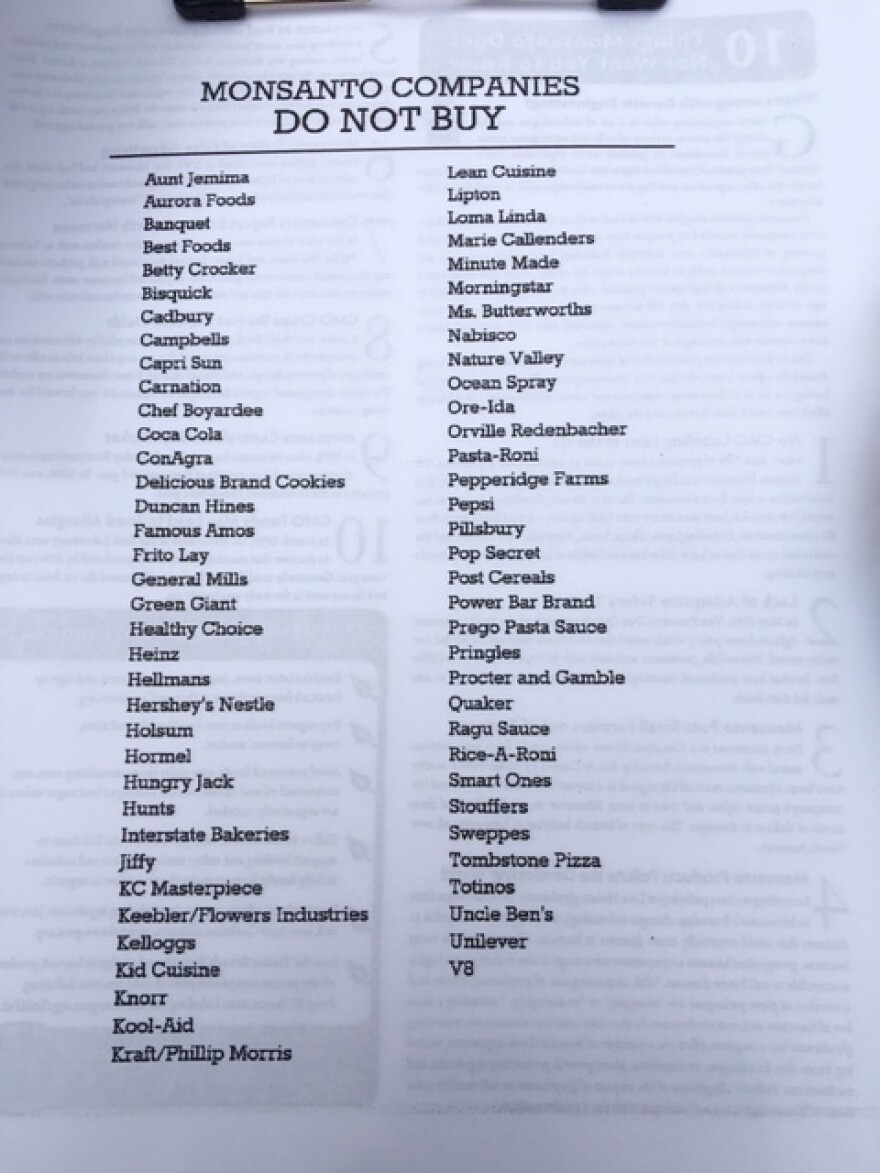Activists protesting genetically modified foods gathered on the grounds outside the state capitol in Albany on Saturday in solidarity with the international "March Against Monsanto.”
"It's happening globally, in many countries, like 36 countries and over several hundred cities, and it's the March Against Monsanto, now Monsanto is this giant chemical company, basically."

Former Albany mayoral candidate Jesse Calhoun was among locals who marched against Monsanto. The day included worldwide demonstrations aimed at raising consumer awareness about possible long-term health risks associated with genetically modified organisms in foods and a call that GMO products be clearly labeled so that shoppers can make informed decisions. "And it's an interesting struggle because Monsanto has such an influence on the government that many Monsanto executives have held positions within the FDA. Over the past 10 years, seven or so have held positions within the FDA. And the FDA mission statement is to kind of label foods, things like that, make sure we know what we're eating, but Monsanto has an interest in not labeling the foods, for their own reason."
Calhoun encourages consumers to google lists of certified non-GMO products they can print and take to the market. Food activist Joanne Farrell believes most people are unaware of the “GMO dilemma.” "They are altering everything from animal feed, to goats, pigs, cows, chicken. Even salmon, and these genetic modifications are a more serious threat. There's no studies, there's no public awareness, there's no news about it in the public, so people don't even know what they're eating."
Nevertheless, public opposition to what is perceived as corporate control over the food system is growing. Activists say more than 90 percent of U.S.-grown corn, soybean and cotton is genetically-modified. They insist Monsanto's control over prices and seeds in certain markets has exploited farmers.

Organizers behind the March Against Monsanto worldwide campaign say studies show St. Louis-based Monsanto’s GMO's lead to various ailments and illnesses, including cancer, infertility and birth defects. They also claim the company's weed-killer "RoundUp" bears responsibility for the diminishing bee population, and insist the U.S. Food and Drug Administration is influenced by former Monsanto executives.
Monsanto returned a request for comment via email, the text is posted at the bottom of this article.
The timing of the march is significant, as Monsanto and German corporation Bayer AG have been discussing a multi-billion dollar merger that could, according to the Wall Street Journal, "reorder the pesticide and seed business," creating the world's largest agricultural supplier.
In 2011 CBS News reported that Bayer paid "tens of millions" of dollars to end a three-decade long scandal in which the company sold HIV-contaminated blood products to hemophiliacs, thousands of whom later died of AIDS.
Farrell warns consumers: beware of corporate propaganda. "A new report came out two days ago saying 'GMOs are all safe.' Well, GMO's is not one specific thing. It is tens of thousands of alterations that have been made to the genetic composition of not only fruits and vegetables, but animals and fish. We would have to test each individual alteration that has been made to see if that specific alteration is safe. We don't know the ramifications of how this is all gonna play out down the road."
The National Academies of Sciences, Engineering, and Medicine issued a 388-page report last week saying genetically engineered crops have benefited agriculture, and their foods products do not pose a threat to human or animal health. The report, which examined over 900 studies, took two years to compile. Requests for comment from the FDA were not answered.


Here is Monsanto's statement - it was received after the story first aired at Noon on Midday Magazine:
In regard to the event please know that the 22,000 people of Monsanto are committed to having an open dialogue about food and agriculture – we’re proud of the work we do, and we’re eager for people to know more about us. We’re also proud of our collaboration with farmers and partnering organizations that help make a more balanced meal accessible for everyone. Our goal is to help farmers do this in a more sustainable way using fewer resources and having a smaller impact on the environment. We know people have different points of view on these topics, and it’s important that they’re able to express and share them.
In regard to graph one and the inaccurate statement “Monsanto has an interest in not labeling the foods”, we fully support the idea of providing information to consumers to help them make choices about the foods they purchase and eat and we support the right of food companies to voluntarily label products. It is important to us that this information is truthful and does not mislead the consumer about the quality or safety of the food and that it is provided in a transparent way. What concerns us and what we don’t think is beneficial for consumers is a state-by-state patchwork of labeling laws. The confusion caused by multiple differing state requirements, as well as the additional cost this would create for all families would be unworkable. And as we have seen from recent state ballot initiatives, when consumers are presented with information on the implications of a state-by-state approach to labeling – including the additional cost it would mean for their family – they are not supportive of such an approach.
In regard to graph two and the inaccurate statement “They are altering everything from animal feed to goats, pigs, cows, chicken” we are an agricultural company which sells seeds to farmers. There are currently 9 crops commercially available from GMO seeds (corn, soybeans, cotton, alfalfa, sugar beets, canola, papaya, squash and potato.
In regard to graph two and the inaccurate statement “there’s no studies” and in graph 5, I’m surprised the interviewee was not countered by the internationally reported National Academies of Sciences, Engineering, and Medicine (NAS) study just released last week. Many of us at Monsanto are parents who have spent a lot of time thinking about and studying GMOS and we feel confident feeding them to our kids. A big part of that confident comes from knowing about all the independent experts who’ve looked at GMOs and concluded that they’re as safe as other foods. That includes groups like the American Medical Association and the World Health Organization, as well as government agencies like the FDA. GE crops have been tested and reviewed more than any other crop products in the history of agriculture. After 30 years of research and assessments, the science and safety behind GE crops has been well established and strongly supported by the scientific community – and last week’s announcement by the National Academies of Sciences, Engineering, and Medicine underscores this conclusion: Genetically Engineered Crops: Past Experience and Future Prospects”. (Summary) .
Here are some of the stories for your reference:
- Scientists Say GMO Foods Are Safe, Public Skepticism Remains, National Geographic
- Genetically Engineered Crops Are Safe, Analysis Finds, The New York Times
- Are GMO crops safe? Focus on the plant, not the process, scientists say, Washington Post
- Report: GMO crops not harmful to humans, but weed resistance is a problem, Chicago Tribune
- Study finds no adverse health effects from genetically engineered crops, The Hill
- Modified Crops Not Seen Adding to Human Health Risks, Study Says, Bloomberg
- U.S. panel releases consensus on genetically engineered crops, Science
- National Academy of Sciences Report Finds no Food Safety or Human Health Impacts from GE Crops, CSPI
- NAS Study Backs Safety Of GMO Foods, Agri-Pulse
- U.S. panel: GE crops safe to eat, but mandatory labeling still a good idea, Politico







